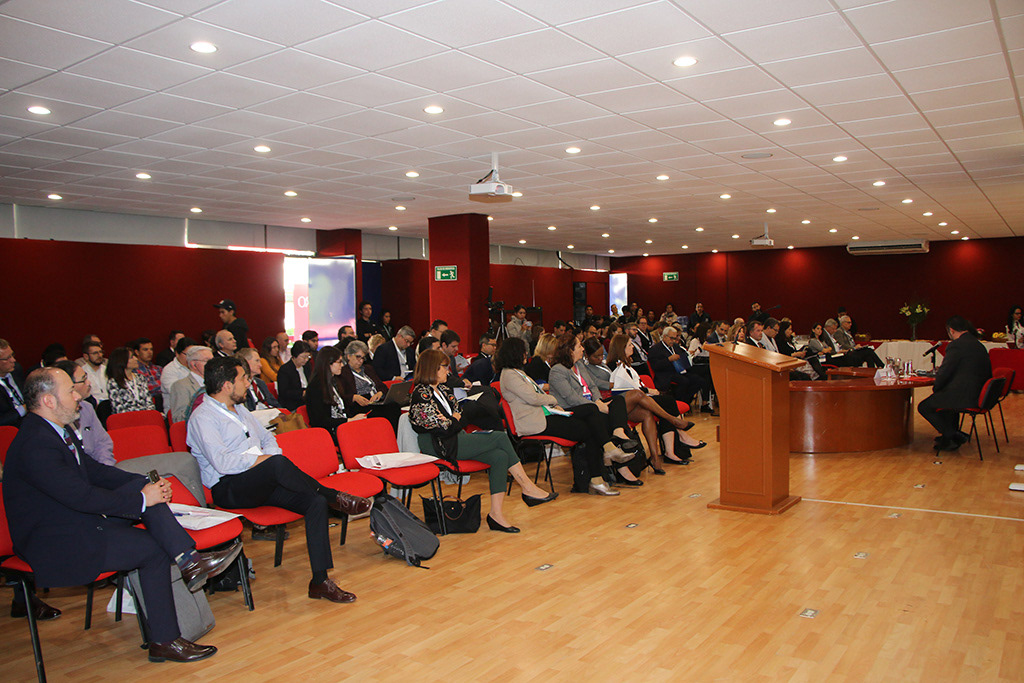Social Transformation: Strategic internationalization, advocacy and networking, was the theme addressed at the International Education Meeting of Jesuit Institutions of Higher Education, held from 4 to 6 November at the Universidad Iberoamericana Puebla, Mexico.
With the attendance of more than 80 colleagues from 47 institutions in 22 countries. This meeting, organized by several regional associations and with a global focus, is the first in the light of the newly formed International Association of Jesuit Universities, IAJU. The group of international education professionals had met annually under continental organization schemes in America.
Michael J. Garanzini, S.J., Secretary for Higher Education of the Society of Jesus, through a video at the opening of the meeting, pointed out the need for global perspectives on current issues. He also mentioned some projects corresponding to the IAJU: The new paradigm in the education of business schools, peace and reconciliation around the world and promotion of Jesuit education worldwide through mobility under the new Magis Exchange project. He concluded his message by highlighting the importance of the role of International Education professionals: you are key to our success, success as an organization, success as a global body of Jesuit higher education institutions, you know, better than anyone else, to promote the globalization of Jesuit higher education. We are unique. I believe that there is no similar group in the world that has 200 institutions around the globe, 64 countries, with one mission and one particular educational focus: the Jesuit mission and Jesuit education.
The rector of IBERO Puebla, Mario Ernesto Patrón Sánchez, gave the first keynote lecture “Perspectives and Challenges in the Internationalization of Higher Education: A Mexican Perspective”, with the objective of contextualizing the audience with the situation of the country. Patrón Sánchez recalled that the first requirement of IBERO Puebla as an educational institution is to know the reality we wish to transform. “We are a university that is assumed as a public good, a social good that finds its standards of demand in service to others.

Ernesto Cavassa, SJ, AUSJAL President, and Michael Sheeran SJ, AJCU President, shared the progress of the IAJU Board of Directors, the meetings held and the progress in the implementation through the work teams, while also learning about the work in the Southeast Asian region through Fr. Roy Pereira, representative of Xavier’s College in Bombay, India.
During these 3 days different sessions were also held which dealt with topics such as alternatives for financing mobility and exchange, dual language immersion programs, Ignatian dimensions of a real commitment with the world, alumni groups, strengths and unique benefits of working collaboratively within the Jesuit network for teaching, research and service, among others, which sought to bring reflection and action in line with the Universal Apostolic Preferences.
Then was the turn to talk about Venezuela and Nicaragua, with José Virtuoso, SJ, and a video message from the rector of the Central American University of Nicaragua, Fr. José Idiáquez, SJ. The university communities represented were invited to continue collaborating in solidarity to support students and teachers, as well as to raise their voices against the abuses they have suffered recently.
Rafael Velasco, SJ, Provincial of Argentina-Uruguay, spoke about the relevance of Jesuit universities and asked the audience to reflect by saying that “we know the enormous apostolic possibilities offered by universities. We also know what it costs to run a university. What the weight of a structure means: getting funds, sponsors, allocating resources, people, rankings, etc., teacher selection, egos fights, budget allocation battles, the dynamics of competition in a competitive world and its collision with our logic of service. The criteria of the Kingdom of God soon come into tension with the criteria of the world in which university life is given, because if we do not rank well we are not chosen, but what is the price to rank well? Do we allocate resources where Jesus would put them?”.
As a final remark, in a video produced by the Curia in Rome, Arturo Sosa, SJ highlighted: “I want to offer you a word of encouragement so that, in meetings of international networks, you will always look for new ways to develop and strengthen our apostolic work. We count on each one of you and we need your specific contribution to this common mission. What we can do together and together clearly outweighs what we can do as separate institutions. Our added value that resides in our mission is immense and for that reason today I encourage you again and we are enormously grateful to you for the contribution that you make.”
The organizing committee, made up of colleagues from AJCU, AUSJAL and the KIRCHER network, thanked the representatives of 5 of the 6 geographical regions into which the higher education entrusted to the Society of Jesus is divided for their attendance and reported that the venue for the next meeting will be announced before the end of the year.
Gallery of Pictures of the Meeting
You can also access too daily videos of the meeting: Video Day 1 | Video Day 2 | Video Day 3
